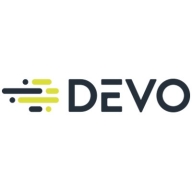

Both Logpoint and Devo are prominent SIEM solutions. Devo appears to have an edge due to its advanced analytics and scalability features suitable for larger-scale deployments.
Features: User reviews indicate that Logpoint is notably strong in ease of use, reporting capabilities, and overall user interface. Devo stands out for its advanced analytics, scalability, and comprehensive feature set, making it more suitable for extensive deployments.
Room for Improvement: Logpoint users highlight the need for better integration capabilities, more frequent updates, and improved customization options. Devo users often request enhancements in customer support, pricing flexibility, and feature documentation quality.
Ease of Deployment and Customer Service: Logpoint's deployment is described as straightforward, and users give positive feedback regarding its customer service. Devo, while having a robust deployment model, receives mixed reviews about its customer service, indicating room for improvement.
Pricing and ROI: Logpoint is perceived as having reasonable pricing with satisfactory ROI. Devo, despite being more expensive, is considered worth the investment due to its rich features, with users finding its overall value justifies the higher price tag.
The technical support for Logpoint is very good, and I would rate it as nine out of ten.
Logpoint's customer support is not sufficient with only one engineer in the US.
I recommend a submission to Logpoint because I worked with it before.
It is web-based and accommodates the expansion of our organization.
Logpoint is scalable and capable of expanding.
I have received reports indicating glitches and downtimes with Logpoint.
This is particularly evident when dealing with failed login attempts and determining true versus false positives.
Dealing with foreign entities for support was a challenge, leading us to switch providers due to lack of adequate support.
Logpoint's UEBA is a weak point, while Exabeam's UEBA has extra AI through automation.
Logpoint needs to be cloud-native, as currently, it is not.
I rate the pricing at eight, suggesting it's relatively good or affordable.
When they see a spike in a line chart for a failed login, which could be a true or false attempt, they can click that spike, and a table widget on the same active board instantly populates with raw logs of data for those specific failed logins.
The UEBA enables us to monitor at the device level, and SOAR provides playbooks and templates that we can modify and incorporate into the platform.
Exabeam's advantage is its AI-driven network AI; this AI feature is available, and Exabeam is powerful.
It effectively facilitates logging and log storage and assists in security event management by ingesting security events.
| Product | Market Share (%) |
|---|---|
| Devo | 1.1% |
| Logpoint | 0.9% |
| Other | 98.0% |

| Company Size | Count |
|---|---|
| Small Business | 8 |
| Midsize Enterprise | 4 |
| Large Enterprise | 11 |
| Company Size | Count |
|---|---|
| Small Business | 18 |
| Midsize Enterprise | 3 |
| Large Enterprise | 4 |
Devo is the only cloud-native logging and security analytics platform that releases the full potential of all your data to empower bold, confident action when it matters most. Only the Devo platform delivers the powerful combination of real-time visibility, high-performance analytics, scalability, multitenancy, and low TCO crucial for monitoring and securing business operations as enterprises accelerate their shift to the cloud.
Logpoint is a cutting-edge security information and event management (SIEM) solution that is designed to be intuitive and flexible enough to be used by an array of different businesses. It is capable of expanding according to its users' needs.
Benefits of Logpoint
Some of the benefits of using Logpoint include:
Reviews from Real Users
Logpoint is a security and management solution that stands out among its competitors for a number of reasons. Two major ones are its data gathering and artificial intelligence (AI) capabilities. Logpoint enables users to not only gather the data, but also to maximize both the amount of data that can be gathered and its usefulness. It removes many of the challenges that users may face in data collection. The solution allows users to set rules for collection and then it pulls information from sources that meet the rules that have been set. This data is then broken into manageable segments and ordered. Users can then analyze these ordered segments with ease. Additionally, LogPoint utilizes both machine learning and AI technology. Users gain the ability to protect themselves from and if necessary resolve emerging threats as soon as they arise. The AI sets security parameters for a user’s system. These act as a baseline that are triggered and notify the user if anything deviates from the rules that it set up.
The chief infrastructure & security officer at a financial services firm writes, “It is a very comprehensive solution for gathering data. It has got a lot of capabilities for collecting logs from different systems. Logs are notoriously difficult to collect because they come in all formats. Logpoint has a very sophisticated mechanism for you to be able to connect to or listen to a system, get the data, and parse it. Logs come in text formats that are not easily parsed because all logs are not the same, but with Logpoint, you can define a policy for collecting the data. You can create a parser very quickly to get the logs into a structured mechanism so that you can analyze them.”
A. Secca., a Cyber Security Analyst at a transportation company, writes, “It is an AI technology because it is using machine learning technology. So far, there is nothing better out there for UEBA in terms of monitoring endpoints and user activity. It is using machine learning language, so it is right at the top. It provides that capability and monitors all of the user’s activities. It devises a baseline and monitors if there is any deviation from the baseline.”
We monitor all Security Information and Event Management (SIEM) reviews to prevent fraudulent reviews and keep review quality high. We do not post reviews by company employees or direct competitors. We validate each review for authenticity via cross-reference with LinkedIn, and personal follow-up with the reviewer when necessary.